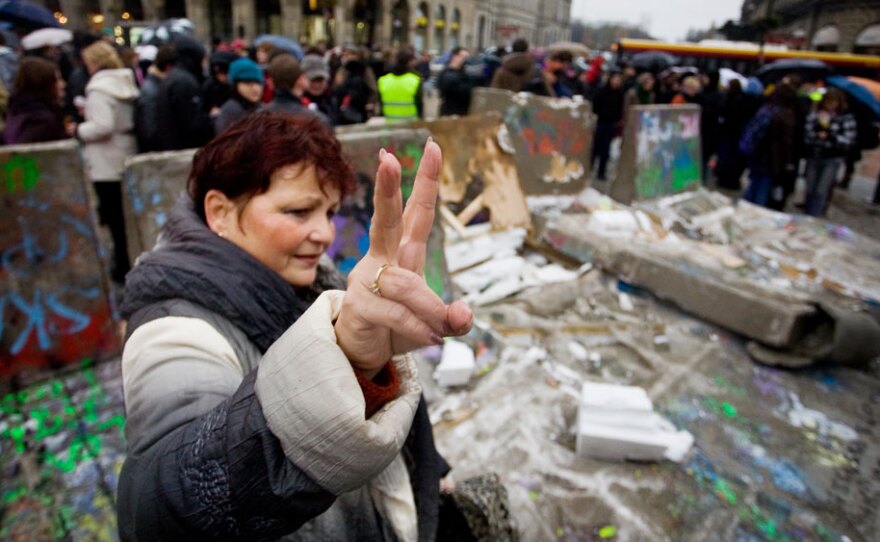This week marks 20 years since the fall of the Berlin Wall, which divided the city and served as the symbol of a Europe divided between communist East and democratic West. In a weeklong series, those who lived through those events two decades ago share their memories of the momentous change in Eastern Europe.
Many Polish citizens are looking at the celebrations in Germany this week with smiles and the occasional smirk.
The iconic photos of the Berlin Wall falling dominate the popular narrative. But the anti-communist revolution that swept the region began in Poland years earlier with protests by the outlawed Solidarity labor movement.
Two decades after striking shipyard workers helped to spark the end of communism, many Poles today are busy enjoying the fruits of capitalism.
Since joining the European Union in 2004, Poland has developed the most dynamic economy in Eastern Europe and fared the best among EU countries during the recent financial crisis.
Economic malaise swept Eastern Europe this year. But it's easy not to notice that in Warsaw, where young Poles are clubbing the downturn away.
Enjoying Freedom
The city's glitterati recently packed the grand opening of yet another new dance club, this one called Generation Nine. Why nine? It just sounded good, a bartender says as he pours liberal doses of Polish vodka to a see-and-be-seen crowd.
These days Poles are spending their way to prosperity: Strong domestic consumer spending has helped insulate the country from the global financial shockwaves. Poland remains the only country in Europe with positive growth in the second quarter this year.

Some of the old dreary Soviet bloc apartment buildings are still around. But some Warsaw interiors are getting a facelift. Polish entrepreneur Anna Kiersnowska and her brother founded a chain of specialty home and office decorating stores. For textured, fuzzy or bright walls, see Kiersnowska at EkoDecor.
A member of Kiersnowska's staff trains a new employee in how to texture a wall with decorative plaster. EkoDecor is hiring. They're opening new stores across Poland and expanding to other parts of Eastern Europe.
"Communism destroyed our production, actually, so now we had to catch up," Kiersnowska says. "And I think that is motivating, that we have the possibility to have a free market and to make our own private businesses. I think people enjoy actually the freedom."
Poland was accepted into the EU in 2004, and EU support and money helped build the country's post-communist economy. Agricultural exports skyrocketed as soon as Poland became part of the single market and trade barriers fell. Poland has a far bigger inflow of foreign capital because it's part of the EU and benefits tremendously from EU subsidies for agriculture and other products.
A Good Life Unimaginable By Previous Generation
But in a sign of the times, several of the historic shipyards where Solidarity was born are being downsized, sold off or shut down. Old fears still linger, as well, especially about Russia and its energy policies. "Yesterday tanks, today oil," Zbigniew Siemiatkowski, a former head of Poland's security service, said recently of Russia.
But shipyard struggles and energy policy are of little concern to most young Poles, such as 26-year-old waitress Ewelina Ostas. She is part of the new generation of Poles embracing the good life and experiences her parents' generation never knew.

"We can travel, we can meet new people, we can explore, we can enjoy life. After work, we're trying to have fun with our friends," she says.
Ostas moved to Warsaw from a small town in the north seven years ago. She works at a hip restaurant and club and enjoys her free time in ways her parents' generation could only imagine. She says her mother and father well remember life under communism and martial law with its deprivation, fear, dreary state-run TV and nightly curfew.
"We have cultural places. We can have our free time to spend on. My parents told me they hadn't such things. They couldn't go out after 10 o'clock. People of my age, we are more free. We can enjoy our life, not live in fear," she says.
The Banality Of Normalcy
It's a far cry from the rough and tumble of shipyard labor protests, the long slog for basic freedoms started by the Solidarity movement. Just 20 years after strikes and street protests eventually led to secret negotiations with the communists and a peaceful transfer of power, the revolution seems like ancient history for this new generation of Poles.
Michal Broniatowski, a former reporter who was close to the Solidarity leadership, covered the revolution. Now, he is a media entrepreneur and businessman.
"(The new generation has the) Internet given for granted, they have iPhones given for granted. Why should they bother about what happened years ago?" he says.
Broniatowski says he is heartened that his kids are growing up with the banality of normalcy.
"My daughter is constantly asking me about what was going on then and she is very keen to listen. But of course she can't understand life under communism because no one can understand it because it was so stupid. It's a problem of their parents, who sometimes tell them funny stories about empty shops. It's a funny story for [the younger generation], but completely not their business. It's a normal young generation, same in the U.S. and Western Europe. And I'm very, very happy to see that, very happy that my kids are living in such an environment," he says.
But the Polish gloating may be premature. Economists say the economic success is real, but also fragile. A growing credit crunch and strains on the labor market could lead to more joblessness. Economists are warning of the potential for pain.
Despite the warnings, Poland in 2009 looks self-assured, hopeful and economically self-confident.
Copyright 2022 NPR. To see more, visit https://www.npr.org. 9(MDAzMjM2NDYzMDEyMzc1Njk5NjAxNzY3OQ001))







